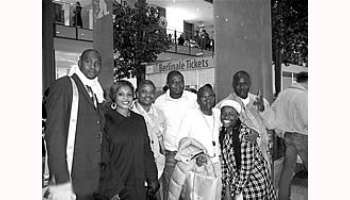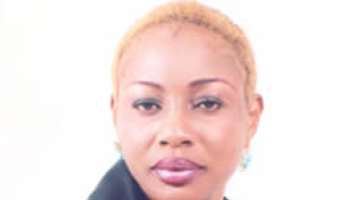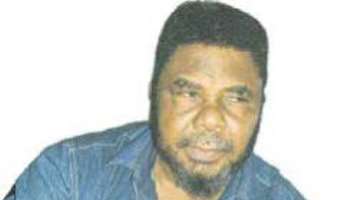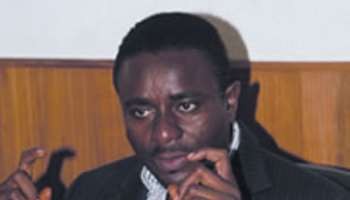For Chief Kanran, Acting Is A Culture
FOR actor, Segun Aderemi otherwise known as 'Chief Kanran', acting, first and foremost, is a culture. His face is synonymous with periodic drama settings in both English Language and Yourba. Also, he is not scarce in theatre productions, television and of late home video. That much is one achievement that cannot be divorced from his background of combined academic and travelling theatre training.
One of the most notable kings that emerged in the old Oyo Empire, Alafin Kanran, was, in the mid 1980s brought out the dramatic prominence on television. Segun Aderemi, the actor behind the daring character explains that the role was given to him as a result of confidence of fate. After several theatre productions of the title, late Femi Philips (husband of actress, Idowu Philips a.k.a Mama Rainbow), and leader of Osumare Theatre Organisation, had invited Segun to be part of the television version of Alafin Kanran for the then newly established Lagos Television, Channel 8.
"The work was originally shot as one hour duration title and transmitted during the independence day anniversary of 1982." The title role, he recalled, "was played then by Philips who, sadly, died after and could not be part of the production when the management of LTV-8 wanted the work reproduced for a much longer duration. When Osumare Theatre was to reproduce the work, of course, several other faces were listed and tried to replace the late Femi Philips in the title role". However, Segun was auditioned for the role, in the presence of such TV big names like Remi Ola Babalola and other LTV-8 staff and it turned out to be a no-contest situation. "Everyone present, behind and in front of the camera, were impressed with my performance. That was how I got the role of Alafin Kanran."
Setting out for theatre
The actor's post-primary school upbringing which climaxed at the Kings College, Lagos Island, (1967/68) after a take-off from Eko Boys High School, Mushin, Lagos, must have prepared him for his career. "I had always wanted to be in the arts, acting particularly". Soon after his secondary school, he enrolled at the Centre for Cultural Studies (now Creative Arts Department), University of Lagos, UNILAG in (1974/75.)
The centre then was more like an institution, training people in such areas as production, directing and scripting. Headed by Professor Akin Euba, the centre was offering just three-month certificate training. He recalled how graduates of the centre were at the end of their training, got federal government scholarships to study Dramatic Arts at the old University of Ife, Ile-Ife (now Obafemi Awolowo University). He was also a beneficiary.
Having had the opportunity of that scholarship scheme, the actor said he finished his three-month certificate course in 1986 and set out, immediately into the professional terrain. That opportunity came from the National Theatre, Iganmu, Lagos, which had a structure in place similar to what is known as "National Troupe of today. It was called Open Theatre and had freelance artistes. Mostly, the group, was engaged by the federal government in Lagos (the seat of power was then at Dodan Barracks), to entertain international guests''.
Stressing that the National Theatre, then, appeared to be "on the right track," Segun further noted that there used to be constant productions of drama, mostly done in English and Yoruba. "Though we were freelance actors, there was hardly a dull moment." According to him, the National Theatre, headed then by Dr. Asiwaju Dada was a beehive of threatrical activities. "Even though the pay was not fantastic, but enough to make the actors happy. For rehearsal fees, I think, we were getting about N300 per week which was a lot of money then," the ambition to be like a Wole Soyinka, Ola Rotimi, Hubbert Ogunde etc was paramount on the minds of the young actors.
He recalls similar working experience at the old NTV (now Nigerian Television Authority, NTA). "At the then National Television NTV, after appearing in what they called drama sketch, we were given a cheque of say N100 or N50 each. It was alright, because, you were happy that you had the opportunity to showcase your talent."
Experience outside government's structure
An actor, they say, is as good as his last performance. Even though government agencies, at various points in time had helped shaped the talent in Aderemi, the need for independent productions, shared by other colleagues gave birth to a group called Anansa Play house. According to him, the Playhouse was founded with other actors like Yemi Remi (his brother), Albert Ogunlade, and Bassey Effiong. They produced such works as Kongi Harvest, Kiriji War, Lamgbodo and the legendary Ovanrenwen Onogbaise.
In spite of the fact that Yoruba movies were winning audiences in the early 1980s when Anansa Playhouse was set up, the group, the actor disclosed was also commanding an impressive audience turn out whenever "our plays were staged at the National Theatre halls where such big films of the late Ogunde, Ade Love and Ola Balogun were showing on the same days with our stage works. Audience members would pay for their tickets knowing fully well they would get value for their money. Sponsorship of such plays used to come from banks, smaller groups and individuals. In addition to whatever a play grossed at the box-office, the premiere, otherwise known as 'command performance' also generated a source of financial support for the Playhouse,'' noted the actor adding that the "opening shows usually attracted donations from groups and individuals."
As a founding member of Anansa, Aderemi however, was not still from the academia of the Thespian Art as he remarked that he had on several occasions being part of productions either by government or the universities. One of such plays, he said, was The Spirit of Lagos, written by Akinwunmi Ishola and directed by Bayo Oduneye. "The play was a federal government production. I remember, then that Uncle B. (Bayo Oduneye) was at the University of Ibadan but was invited to handle the play in Lagos, with rehearsals taking place at J.K Randle Hall. It was staged to mark the 1982 independence anniversary."
Communal value in the actor's family
If ethical conduct in the acting profession is highly disregarded and now a menace in the industry, the artiste traces the root of such behaviours to lack of culture among most of today's 'video-made-in-actor' artistes. He contends that the family-like setting an actor undergoes during training no longer exists.
Comparing the academic setting of old with the Yoruba travelling theatre structure, the actor explains that respect for elders and colleagues were part of an actor's training under people who know what it means to uphold such cultural value as strong pillars in professional conduct. While he agrees that some of today's actors who are guilty of ethical conducts are products of the university setting, Aderemi draws a line between the training that actors go through today and what the older names went through then.
He therefore recommends that, actors, irrespective of whatever academic training previously garnered, should be made to enroll under the leadership of a veteran, or a well respected actor as it is done in the Yoruba sub-division of the movie industry. Even though the travelling theatre culture in that genre of the industry is out of fashion, Aderemi discloses that the apprenticeship structure is gradually making a comeback. On a comparative level, the actor, a former member of the popular, but defunct, Ayo Productions, observes that certain misconduct noticed within the English Language sub-division are unthinkable in the Yoruba setting.
From TV soap opera to video
The actor's stint in the popular but rested TV soap, Megafortune, playing the role of General Philips in about 13 episodes after a short appearance in Mirror In the Sun, was the beginning of his transit from stage to the screen, an unavoidable development. His character of a familiar look of an upper class African, has earned him quite a list of roles, both on TV and home video. In the early days of the home video, the actor's face was one of the most popular that thickened the emergence of the new industry. Ironically, the persecution of the viewing public of the actor's status was no different from those wealthy and influential characters he depicts on the screen. Such behaviour of the fans, Aderemi reasoned, is natural because the potentials of the industry is big enough for actors to be wealthy.
He debuted, as a producer with a home video, Kanran, His Royal Highness in 1994. He has since added other titles like Aare Ona Kakanfo, Tori Nkan Nken and lately Alafin Aole to his credentials.
While he was enjoying his rising profile as a leading name in the nascent video industry, he again saw the need to go back to the university. "At certain period in actor's career, you want to be more adventurous, so I decided to go back to Obafemi Awolowo University to update myself in 1997."
A troubled father from a short romance
One of twin children and last born of Samuel and Sabina Akinremi, Segun, about twenty one years ago had a brief relationship with a lady. The fruits of that romance, he explains with deep emotion is both joy and agony. Joy, in the sense that the lady he describes as a half-caste, Yewande Benedicta Thomas gave him a son called Bode. The sad end of the story is his inability to see his son in the last twenty years.
Explaining the circumstances that led to his predicament, Aderemi says that the relationship, from day one never received the blessing of Benedicta's parents, whose father, he says, is from the Eastern part of Nigeria. "Even my mother too went against our relationship. However, Benedicta and I were too much in love."
Soon after Bode's birth, he continues, "Benedicta fled to the East with her child. I learnt that she is married to another man. I don't have anything against that. But she should, please let me have my son." However, there appears to be hope in the search for his son. "I recently learnt that Bode is presently with Benedicta's sister somewhere in Meiran. But the sister's husband whom I met not too long ago has been avoiding me ever since."
His role in formation of NANTAP
Having had the exposure of both the Yoruba and English language genres of the industry, Aderemi is a strong member of both the Association of Nigerian Theatre Arts Practitioners, ANTP, an umbrella body for Yoruba actors, and its parallel group, National Association of Nigerian Theatre Arts Practitioners, NANTAP.
While the actor confesses that his heart goes to the ANTP, he is spiritually attached to the NANTAP because of his status as a founding member of the group. The incident that led to the formation of NANTAP, he recalls was the usual cap-in-hand approach that artistes found themselves whenever they are in need of emergency medical attention.
An actress, Becky Musa had developed a life-threatening ailment that required urgent medical attention overseas, the cost of which was about $30,000. He explained further "We artistes gathered together, made a lot of noise about her condition and the assistance required." That effort yielded result as the federal government came to the aid of the actress. She was immediately flown abroad, had the ailment treated and returned hail and healthy. Having succeeded in saving the life of one their own, the need to have an umbrella body for the actors suddenly occurred to them. "Myself and actors like Ayo Oluwa Sanmi, late Akeem Shitta, Lara Akinsola, Albert Odulate, Toun Oni, Bassey Effiong (now Dr. Bassey Effiong) and Richard Mofe Damijo, (RMD) and few others that I can't remember their names, came together and realised that an association was long over due. That was how NANTAP came to be."
That effort again was to be of assistance to another actress, Yinka Davies who had an accident on stage in 1985. He narrated that a fund raising was organised and she was flown abroad. "Today, she is a successful musician."
In today's scheme of things, one is curious to know of what relevance is NANTAP. He reacts sharply: "Some guilds or whatever they call themselves, Nigeria Actors Guilds, NAG, is of no consequence. NANTAP remains the real body recognised by government to look after the affairs of actors."
He however confesses that he is more at home with the monther tongue group, ANTP because, "they are better organised and well cultured."
This, he attributed to the longer years of existence of the ANTP which was founded by the like of Hubert Ogunde and living theatre legend like Akin Ogungbe. "There is no basis for comparison between the two. ANTP, for example, has zones in each local government of all the South Western states and some Northern states too."
On the career front, Aderemi's profile may not be as high as it used to be ten years ago, but he is not a forgotten actor yet. The paternity issue of his son is a plight not invincible for 'Kanran', the strong emperor character portrayed by the actor. He however looks unruffled and appears set to scale the mountain. "I am an actor with a difference. I am deeply religious to an extent that I have a doctorate degree in Theology. So no mountain high enough, God willing, I will climb it."
Latest News
-
 I Don't Like Being Sprayed With Money —- Seun Kuti
I Don't Like Being Sprayed With Money —- Seun Kuti -
 “I Wouldn't Advise Myself To Be With Someone In My
“I Wouldn't Advise Myself To Be With Someone In My -
 Nollywood Actress, Etinosa Idemudia Stands With Ph
Nollywood Actress, Etinosa Idemudia Stands With Ph -
 Bobrisky Heads To Appeal Court, Challenges Six-mon
Bobrisky Heads To Appeal Court, Challenges Six-mon -
 “Sometimes, The Answers To Your Problems Lies In Y
“Sometimes, The Answers To Your Problems Lies In Y -
 “Man Of The Year" - Pretty Mike Crowns Portable
“Man Of The Year" - Pretty Mike Crowns Portable -
 Yingi Debuts "Waterside Girl EP"; A Melodic Journe
Yingi Debuts "Waterside Girl EP"; A Melodic Journe -
 Singer, Joeboy Reveals Criteria For Men To Know Tr
Singer, Joeboy Reveals Criteria For Men To Know Tr -
 “I Wish I Had Found Love Before Now– Spyro
“I Wish I Had Found Love Before Now– Spyro -
 Toyin Abraham Appreciates Funke Akindele, Barring
Toyin Abraham Appreciates Funke Akindele, Barring













